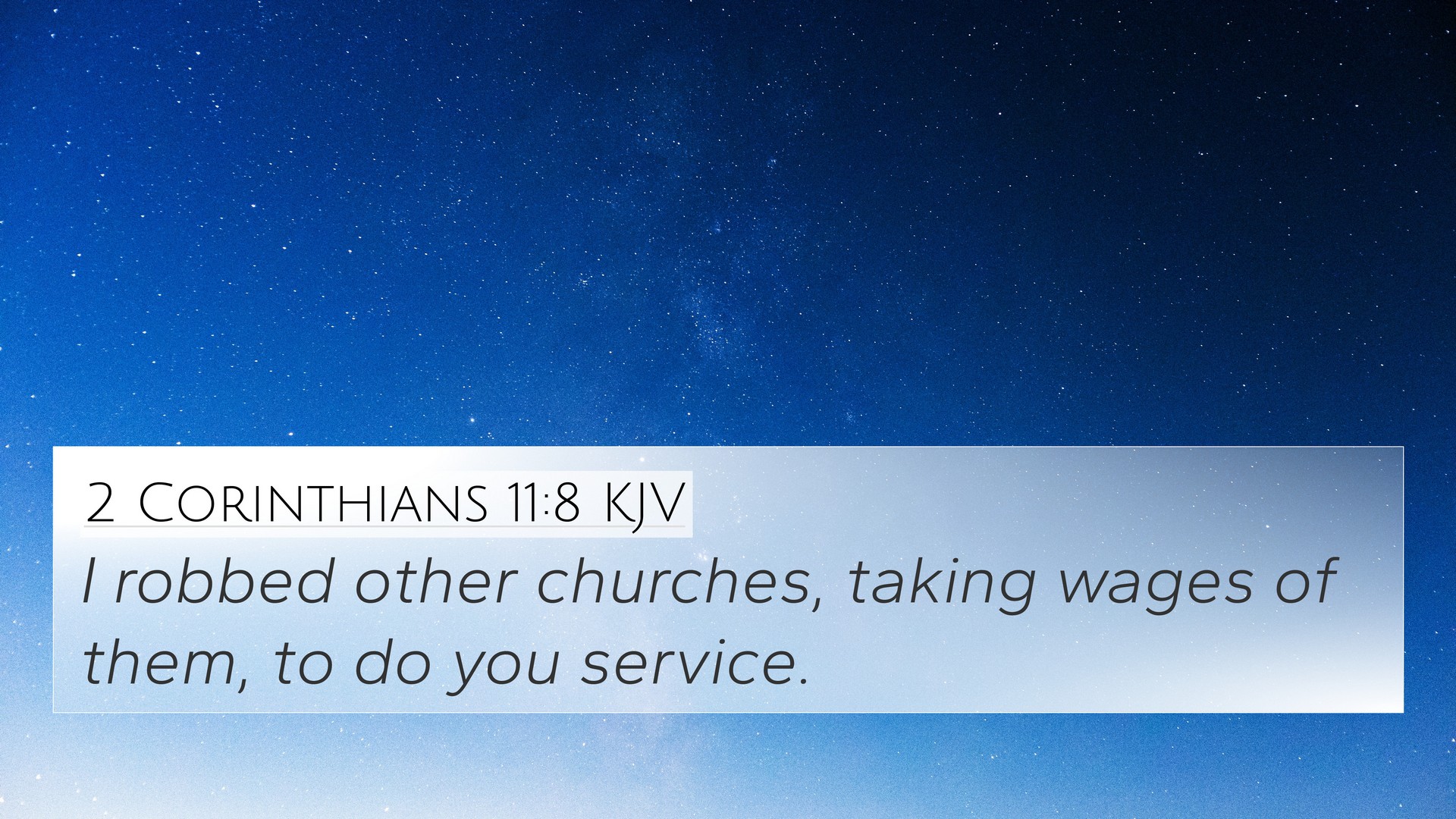Meaning and Interpretation of 2 Corinthians 11:8
Verse: 2 Corinthians 11:8 - "I robbed other churches, taking wages of them, to do you service."
This verse reflects the Apostle Paul's commitment and sacrifice in his ministry to the church in Corinth. Paul is responding to criticisms concerning his support and the nature of his ministry, underlining his reliance on other churches for financial support during his work among the Corinthians.
Detailed Analysis
The verse presents several theological and practical insights, which can be drawn from various public domain commentaries, providing a deeper understanding of the scriptural context.
- Context of the Verse: This verse finds itself within a larger discourse where Paul is defending his apostolic authority against false apostles. It is essential to appreciate the struggle Paul faces to affirm his legitimate role as an apostle of Christ.
- Concept of Sacrifice: Paul’s choice to accept financial support from other churches emphasizes the communal nature of the Church and the partnerships established among believers. He underscores this action as one of service, indicating that ministry often requires mutual support.
- The Nature of Apostolic Ministry: Paul's defense of his actions aligns with his broader theme in the letters to the Corinthians, where he encourages his readers to recognize the authenticity of his ministry in the face of opposition.
Cross-References for Deeper Understanding
To fully appreciate the implications of 2 Corinthians 11:8, here are cross-referenced verses that illustrate similar themes or concepts:
- 1 Corinthians 9:11: "If we have sown spiritual things among you, is it a great thing if we reap your material things?" – This verse reinforces the right of ministers to receive support for their spiritual labor.
- Philippians 4:15-16: "Now you Philippians know also that in the beginning of the gospel, when I departed from Macedonia, no church shared with me concerning giving and receiving but you only." – Paul acknowledges the consistent support of the Philippian church, creating a dialogue on the ethics of church support.
- Acts 18:3: "So, because he was of the same trade, he stayed with them and worked; for by occupation they were tent makers." – Highlights Paul’s tent-making as a means for financial independence to support his ministry when necessary.
- 2 Corinthians 12:13: "For what is it in which you were inferior to other churches, except that I myself was not burdensome to you?" – Paul contrasts his approach with that of others who may demand more from the congregations.
- Galatians 6:6: "Let him who is taught the word share in all good things with him who teaches." – A clear directive on the relationship between the teacher and the taught reflecting mutual support.
- 1 Timothy 5:17: "Let the elders who rule well be counted worthy of double honor, especially those who labor in the word and doctrine." – Asserts the value of financial recognition for church leaders.
- Matthew 10:10: "Nor bag for your journey, nor two tunics, nor sandals; nor staffs; for a worker is worthy of his food." – Jesus' teaching that those who labor in ministry deserve sustenance provided by others.
- Luke 10:7: "And remain in the same house, eating and drinking such things as they give, for the laborer is worthy of his wages. Do not go from house to house." – A reiteration of the principle that workers deserve compensation.
- 2 Corinthians 8:1-4: "Moreover, brethren, we make known to you the grace of God bestowed on the churches of Macedonia..." – It mentions the principles of generosity and support among churches.
- Romans 15:26: "For it pleased those from Macedonia and Achaia to make a certain contribution for the poor among the saints who were in Jerusalem." – Shows the interconnectedness and support between different church bodies.
Thematic Connections
In studying 2 Corinthians 11:8 along with the above references, we observe several thematic connections that run throughout Scripture:
- Support and Community: The mutual support among churches showcases the importance of community in Christian faith.
- Validity of Ministry: Each cross-reference reinforces Paul's integrity and commitment to the Gospel, demonstrating that financial matters in ministry are not merely transactional but relational and spiritual.
- Grace and Generosity: The teachings on generosity between individuals and churches reflect the grace of God that enables believers to support one another.
Conclusion
2 Corinthians 11:8 serves as a reminder of the complexities within church ministry, particularly regarding financial support and the nature of service. By understanding this verse through various commentaries and cross-references, believers can gain insights into the importance of interconnectedness in the Christian faith. By embracing these themes, individuals can foster deeper connections not only within their church but also across the broader body of Christ.





